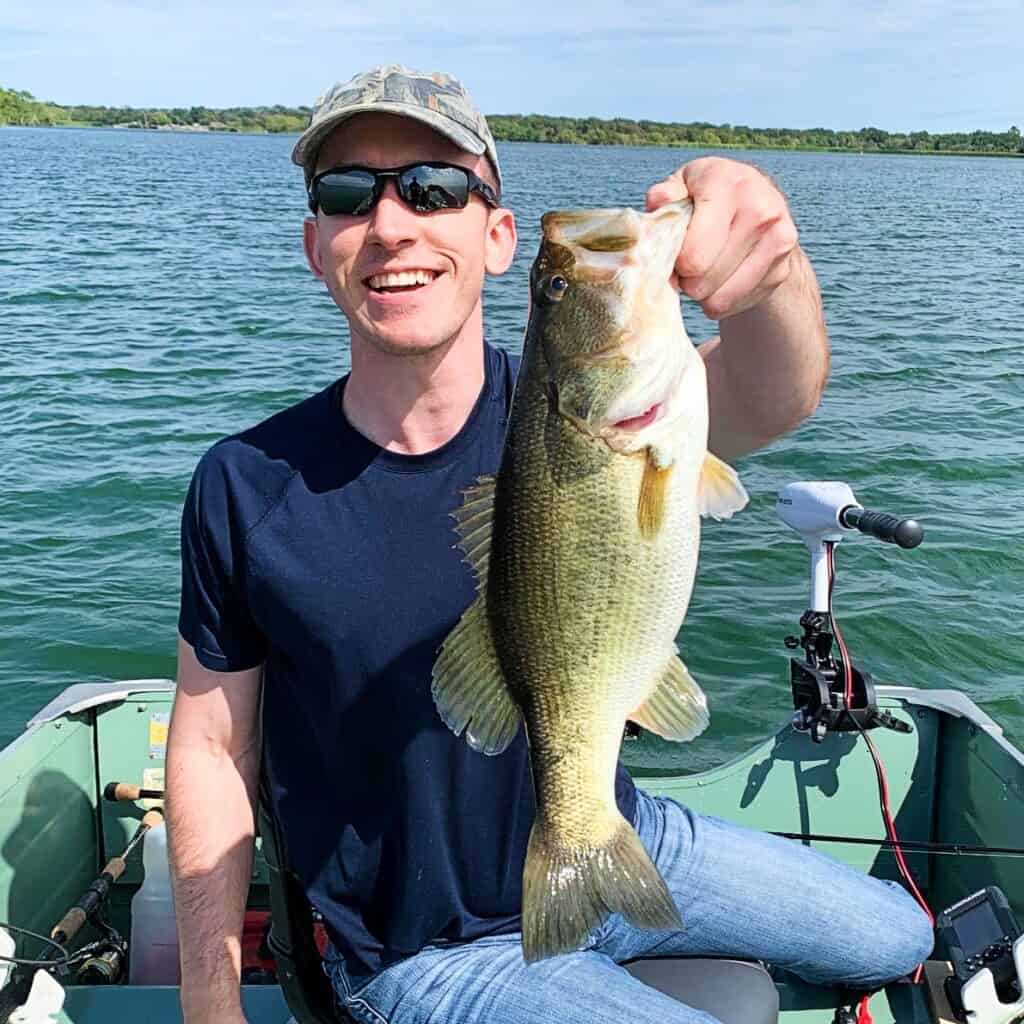
The best and safest way to hold a bass is with a vertical lip grip. Place your thumb inside the mouth and firmly grip the bottom lip. The bass should be perfectly vertical. Any deviation from vertical can put strain on the fish’s jaw and increases chance of injury or death.
How to Hold Bass
The only safe ways to hold bass are the vertical lip hold and the horizontal hold that uses two hands to support the weight of the fish. These grip techniques are perfect for both largemouth bass and smallmouth bass.
Vertical Lip Hold
The vertical lip hold involves holding the bass vertically by its lower lip. Place your thumb inside the mouth and grip the bottom lip. The vertical lip is safe for the bass and angler. The key to the vertical lip is to keep the bass perfectly vertical. Any deviations from vertical can put strain on the fish’s jaw that can cause injury or death.

Lip grips are great for largemouth bass and smallmouth bass because the teeth of these species feel like sandpaper and won’t cut your hand.
Does holding a bass by the lip hurt it?
Holding a bass by the lower lip is safe for the fish. The neutral position puts minimal strain on the fish’s body. The lip grip also makes it easier for the angler to control the fish which minimizes chances of drops that could harm the bass
Do bass teeth hurt?
Largemouth bass and smallmouth bass have small inward facing teeth that have a texture similar to sandpaper. Bass teeth will not hurt you if you firmly grip the bottom lip.
Can a bass bite off a finger?
Bass cannot bite off a finger. Bass feed by engulfing their prey and swallowing food whole. They do not have strong jaw muscles for biting plus their teeth are too small to pose a threat to humans.
Horizontal Hold
The second safe way to hold bass is the horizontal hold. To horizontal hold includes a lip grip on the lower lip of the bass while using your other hand to support the weight of the fish.
Start with on hand firmly holding the bass by the bottom lip in a vertical position. Place the other hand roughly 2/3 of the way down the bottom side of the fish towards the caudal, or tail, fin. Use this hand to support the weight of the fish and turn it to a horizontal position.

Never turn a bass horizontal without supporting its body weight. A horizontal hold without supporting the fish’s body weight can cause severe strain to the jaw that could result in injury or death to the fish.
Can I hold bass by the gills?
A gill plate hold is not recommended for bass. Lip grip is preferred because it is safer for the fish and easier for the angler. Fish gills are highly vascular, sensitive areas of the fish and gill holds are more likely to harm the bass than lip grips.
How do I stop my bass from flopping?
A firm, vertical lip grip usually keeps a bass from flopping. If the fish is extra lively, use your other hand to support the body of the fish to help ensure you can keep a good grip. Do your best not to drop the fish because this could injure it.
What is bass thumb?
Bass thumb is abrasion on the thumb from repeatedly lip gripping bass. Bass teeth feel like sandpaper and can cause a rug burn like sensation after handling multiple fish in a day.
Other Tips for Handling Bass
For all fish intended for release, minimize time handling the fish outside of water. Remember that fish cannot breathe air and that being caught is a stressful experience for them. Most fish can handle a quick grip-and-grin photo without any damage to the fish but do your best to return the fish to the water as quickly as possible.
Bass have a slime, or mucus, layer that protects them from parasites and infection. Anglers should keep contact with this slime layer to a minimum to help keep this naturally protective layer intact. A quick vertical lip grip or horizontal grip supporting the body is perfectly safe for the fish.
Conclusion
Vertical lip grip or a horizontal grip that supports the bass’s weight are the two recommended says to hold bass. Anglers should NEVER angle grip bass because the weight of the fish can cause permanent damage to the jaw.
Check out our related readings to ensure you have the best equipment to catch your next lunker bass.
Rods:
- Best Bass Fishing Rods
- Best Smallmouth Bass Rods
- Best Flipping & Pitching Rods
- Best Frog Fishing Rods
- Best Musky Rods
- Best Walleye Rods
- Best Ultralight Fishing Rods
Reels
Related readings for techniques to catch more bass:
- Tips for Smallmouth Bass Fishing
- Jig Fishing Techniques
- Carolina Rig Fishing Techniques
- Lipless Crankbait Fishing Techniques

Written By: Andrew Juran
Andrew is a seasoned angler with over 25 years of experience fishing across the United States. He has caught hundreds of bass using various techniques and mentored many in the art of fishing. An advocate for sustainable fishing, Andrew is an active member of the Coastal Conservation Association, an organization committed to marine conservation.
For frequent fishing tips, behind-the-scenes looks, and real-time catches, connect with Andrew on Instagram






